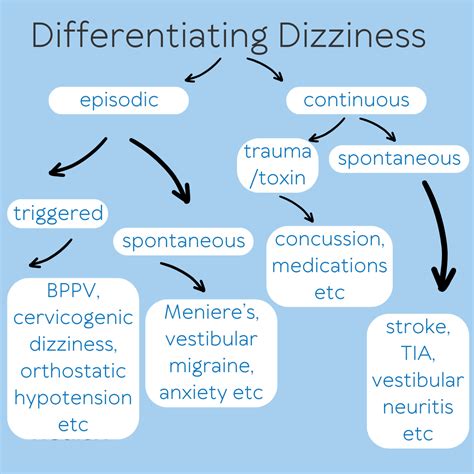Intro
Discover natural remedies to stop dizziness today, alleviating vertigo and lightheadedness with holistic balance techniques, inner ear exercises, and herbal treatments for lasting relief.
Dizziness is a common symptom that can be caused by a variety of factors, including inner ear problems, medication side effects, and underlying medical conditions. It can be a debilitating and frustrating experience, making it difficult to perform daily tasks and enjoy activities. However, there are many natural ways to stop dizziness and improve overall balance and well-being. In this article, we will explore the importance of addressing dizziness and provide tips and strategies for managing and preventing it.
Dizziness can have a significant impact on daily life, affecting not only physical health but also mental and emotional well-being. It can cause feelings of anxiety, fear, and frustration, making it essential to seek help and find effective solutions. Fortunately, there are many natural remedies and techniques that can help alleviate dizziness and improve overall health. From dietary changes to exercises and stress-reducing techniques, we will delve into the various ways to stop dizziness naturally.
The prevalence of dizziness is more common than one might think, affecting millions of people worldwide. It can be a temporary or chronic condition, depending on the underlying cause. While some cases of dizziness may require medical attention, many can be managed and prevented through lifestyle changes and natural remedies. By understanding the causes of dizziness and incorporating healthy habits into daily life, individuals can reduce their risk of experiencing dizziness and improve their overall quality of life.
Understanding Dizziness

To effectively manage and prevent dizziness, it is essential to understand its causes and symptoms. Dizziness can be caused by a variety of factors, including inner ear problems, such as benign paroxysmal positional vertigo (BPPV), medication side effects, and underlying medical conditions, such as low blood pressure, anemia, and diabetes. Other causes of dizziness include dehydration, stress, and poor sleep. By identifying the underlying cause of dizziness, individuals can develop an effective plan to manage and prevent it.
Types of Dizziness
There are several types of dizziness, each with distinct symptoms and causes. The most common types of dizziness include: * Lightheadedness: a feeling of faintness or near-fainting * Vertigo: a spinning or rotating sensation * Disequilibrium: a loss of balance or unsteadiness * Non-vertiginous dizziness: a feeling of dizziness or disorientation without a spinning sensationNatural Remedies for Dizziness

Fortunately, there are many natural remedies and techniques that can help alleviate dizziness and improve overall health. Some of the most effective natural remedies for dizziness include:
- Ginger: a natural anti-inflammatory that can help reduce nausea and dizziness
- Vitamin B12: an essential nutrient that plays a crucial role in maintaining balance and preventing dizziness
- Acupuncture: a traditional Chinese medicine technique that involves inserting small needles into specific points on the body to stimulate healing and balance
- Yoga and tai chi: gentle exercises that can help improve balance, reduce stress, and alleviate dizziness
Dietary Changes for Dizziness
Dietary changes can also play a significant role in managing and preventing dizziness. Some of the most effective dietary changes for dizziness include: * Increasing fluid intake: dehydration is a common cause of dizziness, so it is essential to drink plenty of water and other fluids * Eating a balanced diet: a diet rich in fruits, vegetables, whole grains, and lean proteins can help maintain overall health and reduce the risk of dizziness * Avoiding trigger foods: some foods, such as caffeine, sugar, and processed foods, can trigger or worsen dizziness, so it is essential to avoid themExercises for Dizziness

Exercises can also help alleviate dizziness and improve overall balance and well-being. Some of the most effective exercises for dizziness include:
- Balance exercises: exercises that challenge balance, such as standing on one foot or using a balance board, can help improve balance and reduce the risk of dizziness
- Vestibular rehabilitation: a type of physical therapy that involves exercises and techniques to help the body compensate for inner ear problems and improve balance
- Yoga and tai chi: gentle exercises that can help improve balance, reduce stress, and alleviate dizziness
Stress-Reducing Techniques for Dizziness
Stress can exacerbate dizziness, so it is essential to incorporate stress-reducing techniques into daily life. Some of the most effective stress-reducing techniques for dizziness include: * Meditation and deep breathing: techniques that can help reduce stress and anxiety and promote relaxation * Progressive muscle relaxation: a technique that involves tensing and relaxing different muscle groups to promote relaxation and reduce stress * Yoga and tai chi: gentle exercises that can help reduce stress and alleviate dizzinessPreventing Dizziness

Preventing dizziness is essential to maintaining overall health and well-being. Some of the most effective ways to prevent dizziness include:
- Getting regular exercise: regular exercise can help improve balance, reduce stress, and alleviate dizziness
- Eating a balanced diet: a diet rich in fruits, vegetables, whole grains, and lean proteins can help maintain overall health and reduce the risk of dizziness
- Managing stress: incorporating stress-reducing techniques, such as meditation and deep breathing, can help reduce stress and alleviate dizziness
Home Remedies for Dizziness
There are also several home remedies that can help alleviate dizziness. Some of the most effective home remedies for dizziness include: * Applying cold or warm compresses: applying a cold or warm compress to the forehead or neck can help alleviate dizziness and promote relaxation * Drinking ginger tea: ginger has natural anti-inflammatory properties that can help reduce nausea and dizziness * Taking a warm bath: taking a warm bath can help promote relaxation and reduce stress, which can help alleviate dizzinessConclusion and Next Steps

In conclusion, dizziness is a common symptom that can be caused by a variety of factors, including inner ear problems, medication side effects, and underlying medical conditions. Fortunately, there are many natural remedies and techniques that can help alleviate dizziness and improve overall health. By incorporating dietary changes, exercises, and stress-reducing techniques into daily life, individuals can reduce their risk of experiencing dizziness and improve their overall quality of life. If you are experiencing dizziness, it is essential to seek help and find effective solutions. Consult with a healthcare professional to determine the underlying cause of your dizziness and develop an effective plan to manage and prevent it.
We invite you to share your experiences and tips for managing dizziness in the comments below. Have you found any natural remedies or techniques to be effective in alleviating dizziness? Share your story and help others who may be experiencing similar symptoms.
What are the most common causes of dizziness?
+The most common causes of dizziness include inner ear problems, medication side effects, and underlying medical conditions, such as low blood pressure, anemia, and diabetes.
How can I prevent dizziness?
+Preventing dizziness involves getting regular exercise, eating a balanced diet, managing stress, and avoiding trigger foods and substances.
What are some natural remedies for dizziness?
+Some natural remedies for dizziness include ginger, vitamin B12, acupuncture, and yoga and tai chi. These remedies can help alleviate dizziness and improve overall health.
